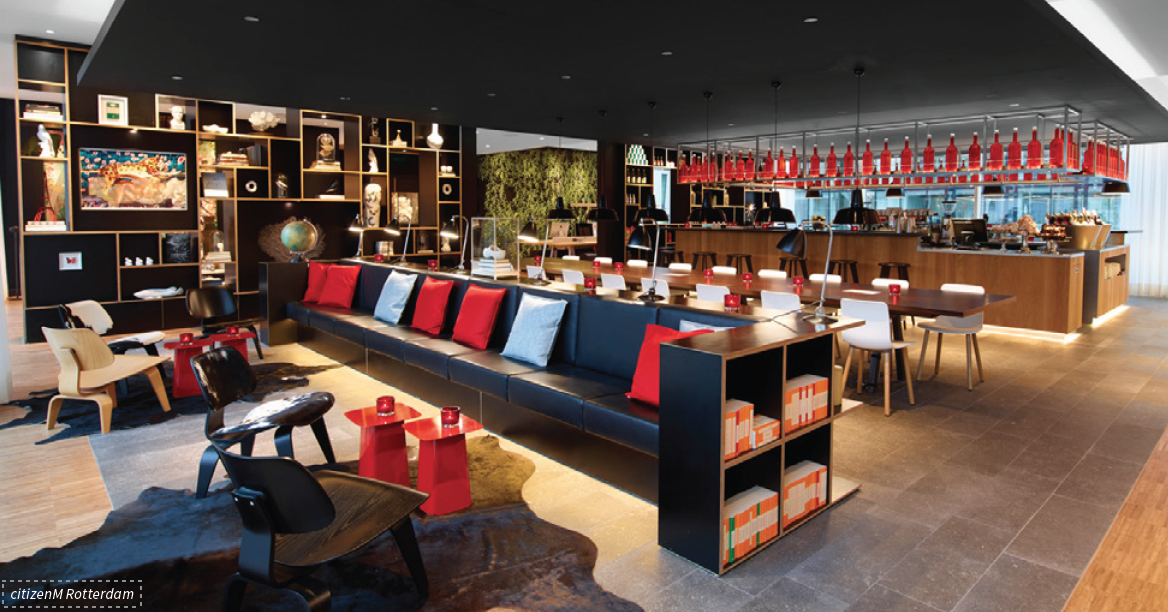“Guest acceptance, high ratings and satisfaction with our concept are still the most important thing”
Two decades ago, smartphones were just becoming vital to our lives, concepts like co-working and co-living didn’t exist yet and the debate among hoteliers was about high-tech versus high-touch. According to Michael Levie, co-founder of the global hotel chain citizenM, among others, industry fragmentation and a lack of tech architecture have left the hotel industry lagging far behind in digital advances. Co-working and co-living have since become part of the hotel landscape, as embodied in new concepts like citizenM, Airbnb and aparthotels. Unlike most hotel operators, these brands have embraced technology in the development of new business processes. Guests have also changed over time, as borne out in the services and products they are choosing. Michael says the coronavirus only amplified that. We sat down with him to talk about citizenM’s success and his vision on ‘talent’.
What would you say was the moment that citizenM qualified as a successful concept? “We opened the very first citizenM hotel near Schiphol Airport in 2008. That hotel was a pioneer in check-ins and introduced self-check-in kiosks and the use of iPads to operate everything in the rooms. After that first hotel we opened more in Amsterdam, Glasgow, London and New York City. All urban hotels at prime locations in or near airports. We have grown rapidly in recent years and added over thirty more hotels across Europe, North America and Asia. Success can be measured in many ways. But most important for us was and still is guest acceptance, high ratings and satisfaction with our concept. The main foundation for that initial success was our teams and the way they take and accept responsibility for guest satisfaction. But also important is the financial success of the citizenM concept, which helped to enable our international expansion.”
You are very focused on talent and training talented people, and have a definite vision on that. Could you share what this vision is? “In many industries you can learn the skills to be successful. The hotel industry is largely based on the transfer of services, which all starts with genuine contact between two individuals. Character and talent are essential for this and almost impossible to train. Traditional job application processes are not all that efficient, in my view, so citizenM created a different recruitment process that reveals applicants’ character in a playful way. Creating the right organisational culture is also crucial and we have put considerable effort into that. Once the culture is internalised in the organisation and supported by everyone, it becomes part of the citizenM brand. Guests come to identify that with us and it leads to higher return rates. And, among staff, to higher satisfaction and lower turnover.”

You are very active in Saudi Arabia these days. What are you working on there? “I have the privilege to be a part of various consulting activities in Saudi Arabia. Whereas the United States and Europe, as well as the Far East, were the driving forces behind much of the global hotel evolution, I think the renaissance is now happening in the Middle East. Projects are focused on 2050 and oriented towards sustainability, tech and new guest experiences, and absolutely nothing will prevent them from doing it all on a grand scale and in a colossal way. Many people are sceptical and very doubtful it will really happen, but if you go there regularly and see it unfolding, those questions quickly fade. Saudi Arabia and its vision for 2030 aim to diversify the country economically on many fronts, with a central focus on growing tourism. They are working on six mega projects now that are literally jaw-dropping.”
What is your view of Zuidas? Is there anything Saudi Arabia can learn from Zuidas, and vice versa? “Saudi Arabia is learning from Zuidas already and I know numerous people and companies are actively involved in that. Zuidas has so much collective knowledge in so many areas and wants to share it. And, yes, I think Zuidas can learn from Saudi Arabia too. Speed, the scope of projects, the deep long-range vision and the large-scale approach are all important to observe, learn from and also keep contributing to. Zuidas of course also represents the Netherlands as a whole in the world. Innovation, creativity, our startup culture and deep knowledge society are highly regarded worldwide. It is great to see how Zuidas’ importance is reflected abroad and how it is profiting from that.”
